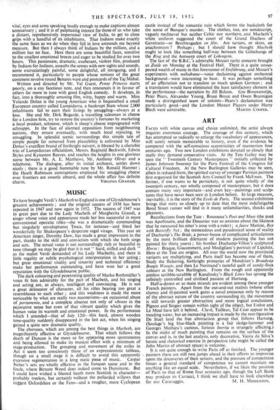MUSIC
To have brought Verdi's Macbeth to England is one of Glyndebourne's greatest achievements ; and the original success of 1938 has been repeated in 1947 and now again in 1952. The success of 1947 was in great part due to the Lady Macbeth of Margherita Grandi, a singer whose voice and appearance made her less successful in more conventional operatic roles—she was a dramatically commanding but singularly unvoluptuous Tosca, for instance—and fitted her wonderfully for Shakespeare's desperate regal virago. This year an American singer, Dorothy Dow, has made a great impression in the part, thanks to the skill and conviction with which she both sings and acts. The actual voice is not outstandingly rich or beautiful in tone (though we may be glad that it is not" hard, stifled and dark" as the realist Verdi demanded of his Lady Macbeth), and there is little regality or subtle psychological interpretation in her acting ; but great emotional vitality and sincerity and technical efficiency make her performance outstanding, and have won her a great reputation with the Glyndebourne public.
The dark colouring and penetrating quality of Marko Rothmiiller's voice fit him admirably for the part of Macbeth, and his singing and acting are, as always, intelligent and convincing. He is not a great delineator of character, all his roles bearing too great a resemblance to each other ; and this weakness is made the more noticeable by what are really two mannerisms—an occasional abuse of portamento, and a complete absence not only of vibrato in the pejorative sense but even of that vibrant quality which gives the human voice its warmth and emotional power. In the performance which I attended—that of July 12th—this hard, almost wooden tone-quality suddenly disappeared in the last act, when his singing gained a quite new dramatic quality.
The choruses, which are among the best things in Macbeth, are magnificently effective at Glyndebourne. That which follows the death of Duncan is the more so for appearing more spontaneous and being allowed to make its musical effect with a minimum of stage-production. The grouping and movement of the exiles in Act 4 seem too consciously those of an expressionistic tableau, though on a small stage it is difficult to avoid this apparently - excessive regimentation in a long static piece of music. Caspar Neher's sets are wholly effective in the banquet scene and in the finale, where Birnam Wood does indeed come to Dunsinane. But I could have wished a blasted heath more Scottish in character— probably treeless, but certainly without the pollarded willows that suggest Oxfordshire or the Fens—and a rougher, more Cyclopean castle instead of the romantic ruin which forms the backcloth for the scene of Banquo's murder. The clothes, too, are nondescript, vaguely mediaeval but neither Celtic nor northern, and Macbeth's white uniform suggested the court of the Grand Duchess of Gerolstein—or Berchtesgaden en fête. Are tartans, or skins, an anachronism ? Perhaps ; but I should have thought Macbeth ought to look like something half-way between the Gibichungs of the Ring and the Antwerp court of Lohengrin.
The last of the B.B.C's admirable Mozart rarity concerts brought us Zaide on Monday at the Festival Hall. There is a quite unsus- pected wealth of music in this forerunner of Entfiihrung, and Mozart's experiments with milodrame—voice declaiming against orchestral background—were interesting to hear. It was perhaps something of an affectation not to translate so much spoken German ; and a translation would have eliminated the least satisfactory element in the performance—the narration by Jill Balcon. Gre Brouwenstijn, Peter Pears, Alexander Young, Bruce Boyce and Owen Brannigan made a distinguished team of soloists—Pears's declamation was particularly good—and the London Mozart Players under Harry


































 Previous page
Previous page